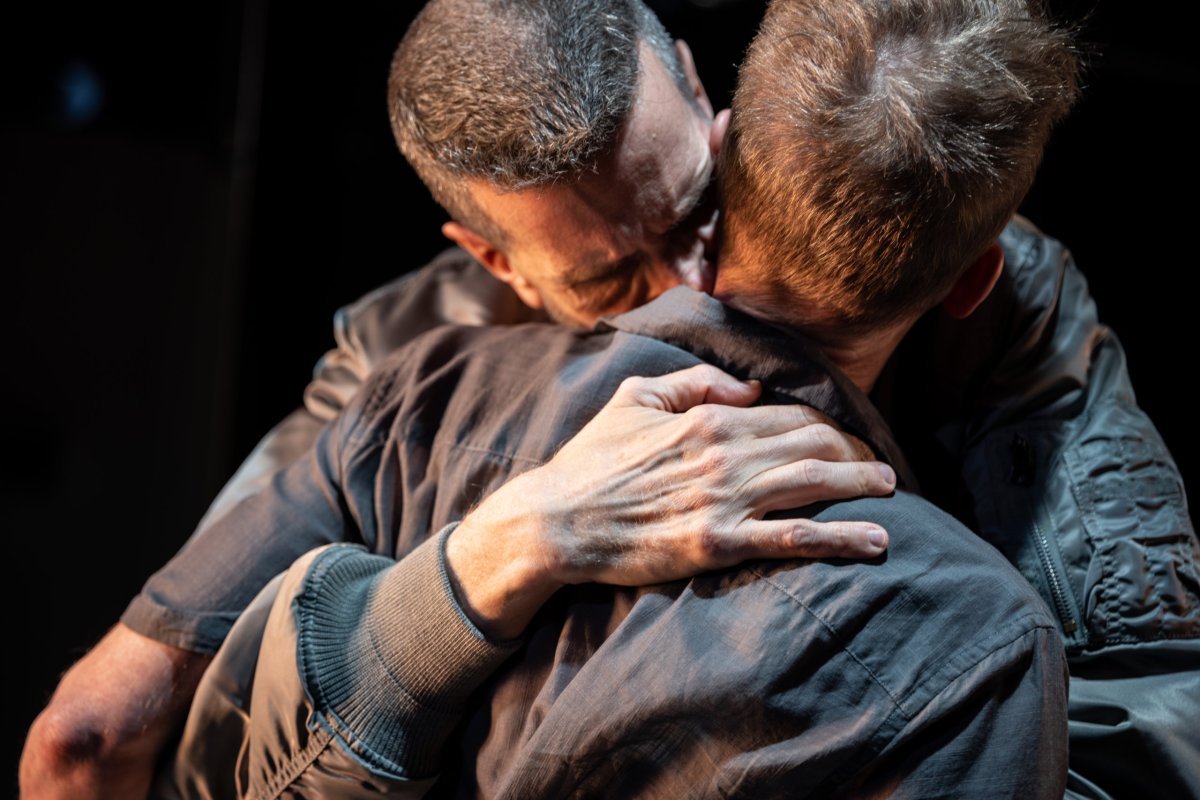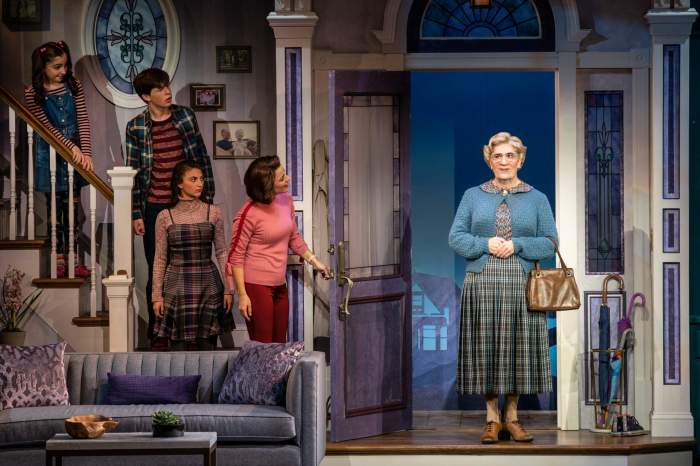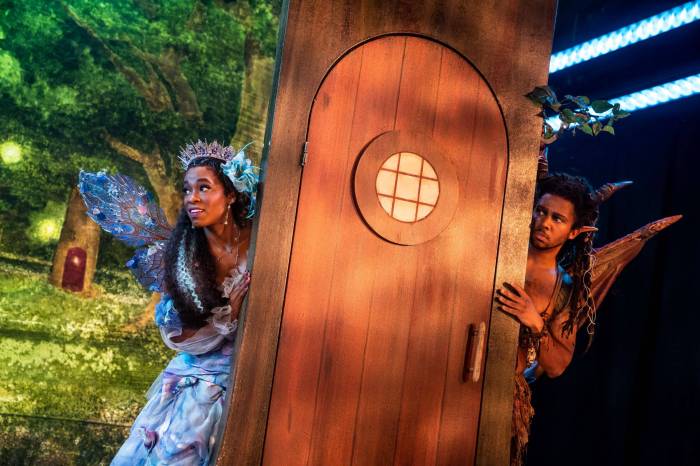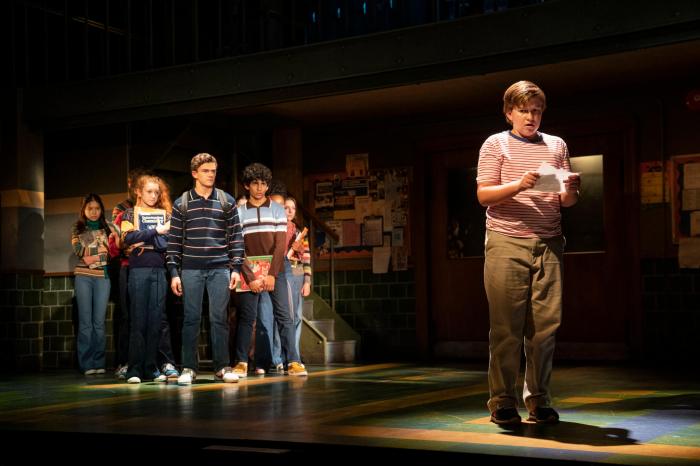Finding authentic gay theater can be a challenge. From casual stereotypes to labored comedy, to overly politicized statements, simple, resonant stories can be elusive. That is not the case with Jacob Perkins’ new play “The Gold Room,” now getting a sensitive and moving premiere at Here Arts Center.
This hourlong two-hander covers a lot of territory, but at its center, it’s a story about discovering oneself and trying to find love in the context of contemporary gay culture. It is heartfelt, incisive, and precise, realistic but with a knowing meta commentary, which makes the play wonderfully theatrical. As the audience pieces the story together through a series of scenes that nimbly hop over time and place, what emerges is a complex portrait of a gay man and his various interactions with different men in his life. It’s structured so that actor Robert Stanton is the central character — a playwright looking to find a career — and Scott Parkinson plays all the other men with whom Stanton’s character interacts.
Playwright Perkins says he first wrote the play in 2018 when he was going through psychoanalysis and realized that looking back at the relationships over his life and how they are “predicated by the relationship with my dad.” In writing the play he was intrigued to see how one actor could take on all the male characters one encounters.
Perkins is a young man who had to find his way through the labyrinth of gay life, starting at 13 interacting with gay men online. He grew up in a repressive, evangelical household in South Carolina, and he says, the virtual world “was the only way out of that claustrophobic environment.”
Indeed, a central question of the play is how do we define ourselves? Do we take on roles — or try them on in different situations? Are we willing to change ourselves to meet others’ expectations? Do we perform different versions of ourselves? Indeed, the poetic disquiet and tension that runs through the play is both touching and accurate as the central character, has a failed online hookup, a fear-filled visit to a doctor, a difficult conversation with an artistic director, and other situations before he finds a kind of resolution, or at least some peace within himself.
Director Gus Heagerty has fully addressed — and beautifully portrayed — the subject matter. “What’s great about [the play] is that it relates to what is performative in our own experiences,” Heagerty said. “Jacob is not afraid to point out the reality of how we’re processing trauma as gay guys.” He adds that sometimes that can be used as a tool to manipulate others as well.
The physical life of the play reflects this. The staging of the intimacy in the piece reflects this — the height of intimacy and vulnerability juxtaposed against the clinical approach to the body. “It’s how the play constantly plays with the audience’s expectations,” Heagerty says.
Actor Robert Stanton, who plays the playwright, says that he found a lot of his own experience reflected in the play — or a version of it. “I think whereas my trauma growing up gay might make me more retiring, Jacob is very interrogative.” Yet the theatricality, what’s playable, comes from Stanton’s character experience the shifting power dynamics in relationships — and sex.
Parkinson plays all the other roles, but he says that they are all aspects of queer men who are also trying to negotiate their ways in the world.
Stanton, Heagerty and Parkinson all use the word “mysterious” in talking about the play. It’s an apt word because in each of the scenes, the characters really don’t know what they’re getting into, whether it’s threatening, dangerous, or the answer they’ve been looking for. That’s what gives the piece its authenticity. It’s also, on many levels, a comedy, though more in the vein of Dante of Chekhov than Neil Simon. It’s a fearless and pointed look at the human condition, and the laughs are rueful and chuckles of recognition.
One of the reasons the piece works so well is that the creators are a tight knit group with a lot of respect and affection for one another. Stanton and Parkinson appeared together in Stoppard’s “The Coast of Utopia,” so they were already comfortable working together — an asset when one is portraying a level of physical intimacy requiring trust. Though Perkins didn’t write the play initially for Stanton, thinking it might be a younger character, he had worked with Stanton in the past and admired his talent to the point where he refers to the actor as a muse.
This is an important play at a pivotal time — where Off Broadway and Off-Off Broadway are looking at theater in new ways. Arguably, what’s happening today reflects the movement of the early 1960s when playwrights were finding new ways to use the theater, even as Broadway was clogged with commercialism. “The Gold Room” manages to be part of that tradition while being original, exciting, and above all honest.
The Gold Room | Here Arts Center | 145 Sixth Avenue | Weds-Sat 7 p.m.; Sun 2 p.m. through November 5 | slowtide.info | 1 hour, no intermission



































